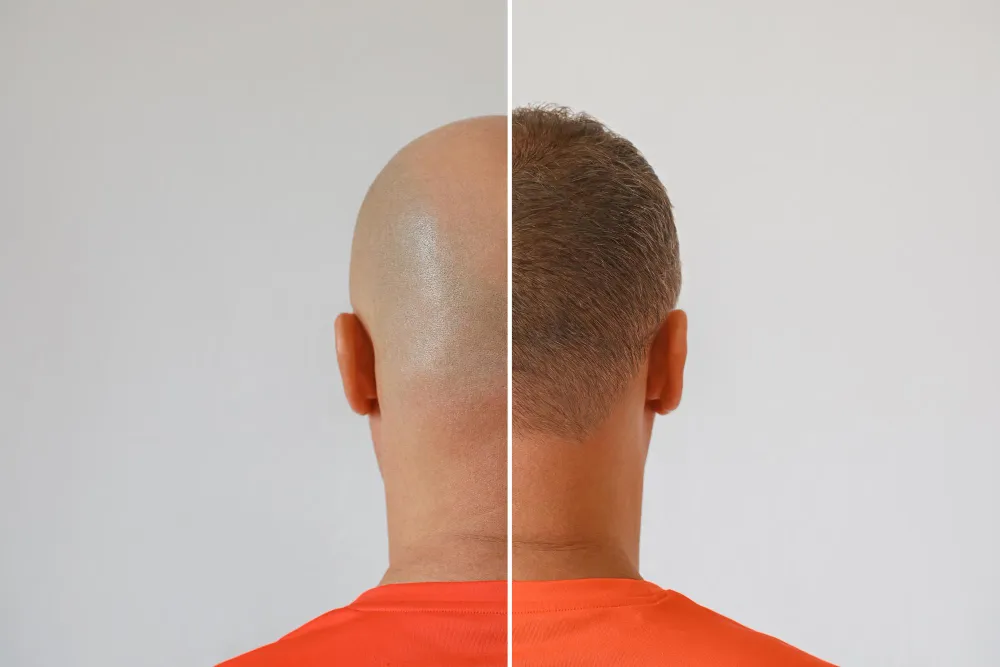After Hair Transplant Care: A Complete Guide
Undergoing a hair transplant is a significant step toward regaining your confidence and achieving a fuller, healthier head of hair. However, the success of your procedure heavily depends on how well you care for your scalp during the recovery period. Proper aftercare ensures optimal healing, minimizes complications, and promotes healthy hair growth. Here’s a detailed guide to help you navigate the post-hair transplant phase.
Immediate Post-Procedure Care
The first few days after your hair transplant are crucial for the healing process. Follow these essential steps:
- Protect the Transplanted Area
- Avoid touching, scratching, or rubbing the transplanted area to prevent dislodging grafts.
- Wear a loose-fitting hat or a protective covering when stepping outside to shield your scalp from dust and sunlight.
- Sleep Position
- Sleep with your head elevated at a 45-degree angle for the first 3-4 days to minimize swelling.
- Use pillows to keep your head propped up and avoid direct pressure on the transplanted area.
- Avoid Washing Your Hair
- Do not wash your hair for the first 48 hours after the procedure.
- Your clinic will provide specific instructions on how and when to start washing your scalp.
Washing and Cleaning
Once you’re allowed to wash your hair, follow these guidelines carefully:
- Gentle Washing
- Use a mild, sulfate-free shampoo recommended by your surgeon.
- Gently pour water over your scalp using a cup or low-pressure showerhead. Avoid direct water pressure.
- Pat dry with a soft towel; do not rub.
- Avoid Harsh Products
- Refrain from using hair styling products like gels, sprays, or mousse for at least two weeks.
- Stick to doctor-approved products during the recovery phase.
Medications and Pain Management
- Prescribed Medications
- Take antibiotics as prescribed to prevent infections.
- Use anti-inflammatory medications to reduce swelling and discomfort.
- Pain Relief
- Over-the-counter pain relievers may be recommended for mild discomfort. Consult your doctor before taking any medications.
- Topical Solutions
- If prescribed, apply medicated ointments or sprays to the donor and recipient areas to promote healing.
Lifestyle Adjustments
- Avoid Strenuous Activities
- Refrain from heavy exercise, swimming, or activities that cause sweating for at least 10-14 days.
- Avoid bending or lifting heavy objects to prevent pressure on the scalp.
- No Smoking or Alcohol
- Avoid smoking and consuming alcohol for at least one week post-surgery, as they can hinder the healing process and affect graft survival.
- Protect from Sunlight
- Avoid direct sun exposure for the first few weeks. If you must go outside, wear a hat or use a sunscreen recommended by your doctor.
Expected Side Effects
It’s normal to experience some mild side effects after the procedure, including:
- Swelling
- Swelling around the forehead and eyes is common and usually subsides within a few days.
- Itching
- Mild itching is a sign of healing but avoid scratching. Use a prescribed anti-itch lotion if needed.
- Scabbing and Shedding
- Small scabs may form around the transplanted follicles and fall off naturally within 7-10 days.
- Shedding of transplanted hair (shock loss) is normal and temporary. New hair growth typically begins within 3-4 months.
Long-Term Care and Maintenance
- Follow-Up Appointments
- Attend all scheduled follow-up appointments to monitor your progress and address any concerns.
- Healthy Diet
- Maintain a balanced diet rich in vitamins and minerals to support hair growth. Include foods high in protein, iron, and biotin.
- Avoid Hair Treatments
- Delay hair coloring, chemical treatments, or heat styling for at least three months.
- Use Recommended Products
- Switch to shampoos and conditioners designed for sensitive scalps to maintain the health of your new hair.
When to Contact Your Doctor
Reach out to your doctor immediately if you notice any of the following:
- Excessive bleeding or swelling
- Signs of infection, such as redness, warmth, or pus
- Severe pain that doesn’t subside with medication
- Unusual or prolonged shedding of transplanted hair
Conclusion
Proper aftercare is key to ensuring the success of your hair transplant. By following your surgeon’s instructions and adopting healthy habits, you’ll maximize your results and enjoy a natural, long-lasting transformation. For more detailed advice tailored to your procedure, consult your hair transplant specialist in Indore.
If you’re looking for expert guidance or have additional questions, visit hairtransplantinindore.com or contact a trusted clinic today.

